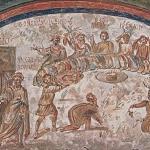
God has no gender. God transcends all genders, and yet all genders participate in and demonstrate divine attributes. This is why Genesis says that God created both male and female in the divine image: “So God created man in his own image, in the image of God he created him; male and female he created them” (Gen. 1:27 RSV).
Masculine, feminine, and even neuter pronouns, can be used for God. When they are used, they do not indicate any gender for God. That is, a masculine pronoun does not mean God is male, nor does a feminine pronoun mean God is female. Every gender represents the divine nature, and equally so. Those who would try to suggest that a convention used in a text represent an absolute statement about God, that is, those who try to engender God through the kinds of genders used in the Scriptural texts and translations they use, end up with a corrupted notion of the divine nature. St. Jerome, knowing that the Holy Spirit has been described with masculine, feminine, and even neuter, pronouns, explained that this points out how the divine nature transcends such genders, and so is comprehended by none of them:
Now no one should be scandalized about this, that among the Hebrews “Spirit” is expressed in the feminine gender, though in our language he is addressed in the masculine gender, and in the Greek language in the neuter; for in the deity there is no gender. And therefore in the three principal languages in which the inscription of the Lord’s passion was written [cf. John 19:20], he is identified by three genders, that we may know that what is diverse has no gender. [1]
This is why, if someone were to use a particular translation of Scripture, and conflate the pronoun choices used in it as indicative of a gender for God, are not only wrong, but end up with a heretical notion of God. It is easy to see why many would want to do so, for it helps promote their own ideological biases, making it seem that Scripture, and the Christian tradition, support them. That is, they suggest one gender is superior to all others because it represents what God is, and usually, those who make this claim are ones who say God is male. Then, it is easy to undermine the rights and privileges of those who are not like God; they are portrayed as second-class citizens of the kingdom of God, and similarly, in secular society. Patriarchy was established upon this framework, and with it, has produced all kinds of dangerous fruit. Women often found themselves forced to “submit” to those who are said to be the ontological superiors, requiring them to accept all kinds of abuse and limits to their potential redress for those abuses.
When a gender-based ideology used to undermine the dignity of others has found a foothold in society, and especially, within the Christian faith, it must be resisted. It is imperative in such a situation to reflect upon the truths which are being diminished through it. For example, if Patriarchy is causing problems, then emphasizing the feminine appropriation of the divine nature by employing feminine pronouns for God, such as when making a translation of Scripture, might be of value. Certainly, when this is done, every effort must be made so as not to repeat the error which is being resisted. Thus, when resisting Patriarchy by using feminine pronouns for God, it must be made clear that what is being said is not that God is merely female, but rather, that all genders come from and represent something of the divine nature, allowing all gendered pronouns to be used for God.
This is an issue which transcends Christianity. Throughout the centuries, Patriarchal ideologies have caused all kinds of problems for women. Abdul Ghaffar Khan saw this in relation to Islam, and especially, with his own people, the Pukhtuns; he struggled against it the best he could, pointing out that one’s position in society should not be determined by one’s gender, but by the deeds one has done. Sadly, as is often common with women who are born into Patriarchal cultures, he had to help inform womem of their human dignity and the rights which flow from it, as many who benefitted from their submission trained them to think they were inferior and should not be given equal status in society:
I had a lot of respect and sympathy for the honour of our womenfolk because, unlike other nations of the West, we had no respect for our women. They were considered inferior to men, although inferiority and superiority are solely dependent upon one’s deeds. Those whose deeds are bad should be considered inferior, irrespective of gender. If a woman performed good deeds, then it was only right that she should be considered superior. God has created men and women to populate the earth, as equal companions. They are like the two wheels of a carriage, which cannot move with one wheel. Pukhtun women are very pious, loving and bashful, and anxious to serve their menfolk. Whenever we visited the homes of our relatives, even though they had domestic help, they would insist that the women of their family serve us. They would place before us whichever delicious dish they had cooked and would eat what was left over. The men never ate with the women and the women also considered this unacceptable. I was the first to take umbrage at this and ate with the women when there were no guests. Gradually, this custom was abandoned by everyone. When I got married, my wife found it very strange to eat with me and would not easily do so as she was so self conscious. [2]
Interestingly enough, as everyone carries the divine image in them, everyone contains in themselves a representation of all potential genders, which is why many can and will develop, and therefore represent, qualities associated with genders beyond their given gender as a way to express themselves. Men who nurture and treasure their “feminine side” are not bad or weak men, even as women who nurture their “masculine side” are not bad women. We pervert the fullness of truth when we undermine the transcendent quality of the divine nature by trying to turn genders into absolutes. So many great men, so many great saints, like St. John of the Cross, found ways to appropriate and celebrate their feminine side (as can be seen in his poems where he talks about himself as a bride). Jesus, likewise, showed his ability to appreciate his feminine side, such as in the way he represented himself as being a mother hen trying to take care of her loved ones (cf. Lk. 13:34).
Ignorance of the relative, and indeed, conventional aspect of gender in relation to the divine nature, and how it is reflected in us, can be very dangerous. For by such ignorance, we perpetuate error, and end up harming many people through that error. Absolutizing gender and connecting such absolutizations with God has all kinds of practical implications, as history has shown in regards Patriarchy. “Certainly, the less someone does who is ignorant the fewer mistakes does he make. The fewer mistakes he makes, the less is the harm he does. The less harm he does the less miserable is he.”[3] So many women have felt the misery living in societies which absolutized the masculine gender, especially those who did so by trying to deify masculinity and make God exclusively male. We still are dealing with the damage those societies have created. Sadly, as many are trying to fix the harm which has been caused, we find many others are fighting back, resisting correction, which is why many have become militant in their denial of the greater truth, the truth that God has no gender. They want to perpetuate ignorance, because, in the end, they find themselves benefiting from it. But we can no longer accept such a simple, dualistic, approach to God. It is long past time Christians stopped embracing the evils of Patriarchy. It is time they affirm the fullness of the truth, and in doing so, find themselves transforming their relationships with each other, so that those who have been unjustly hurt by a bad ideology perpetuated by ignorance can finally be given what should always have been theirs. When Christians do this, they will learn, they are not losing anything, but rather, gaining more, as they realize and apprehend more of the truth for themselves.
[1] St. Jerome, Commentary on Isaiah in St Jerome: Commentary on Isaiah; Origen Homilies 1-9 on Isaiah. Trans. Thomas P. Scheck (New York: Paulist Press, 2015), 539..
[2] Abdul Ghaffar Khan, My Life and Struggle. Trans. Imtiaz Ahmad Sahibzada (Roli Books: Greater Noida, India: 2021), 53.
[3] Marsilio Ficino, The Letters of Marsilio Ficino. Volume 1. trans. by members of the Language Department of the School of Economic Science, London (London: Shepheard-Walwyn, 1975; repr. 1988), 33-4 [Letter 2 to Cosimo de’ Medici].
Stay in touch! Like A Little Bit of Nothing on Facebook.
If you liked what you read, please consider sharing it with your friends and family!
N.B.: While I read comments to moderate them, I rarely respond to them. If I don’t respond to your comment directly, don’t assume I am unthankful for it. I appreciate it. But I want readers to feel free to ask questions, and hopefully, dialogue with each other. I have shared what I wanted to say, though some responses will get a brief reply by me, or, if I find it interesting and something I can engage fully, as the foundation for another post. I have had many posts inspired or improved upon thanks to my readers.














